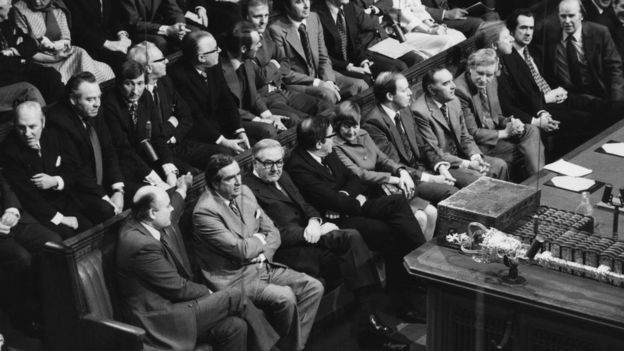Name : Lochlan Gavin Fitzpatrick
Born: 1919
Profession : Politician
Constituency : South Antrim
Early life
Lochlan Gavin Fitzpatrick was born on Easter Day, April 20th 1919. Third child out of eleven, he is the eldest son of Art Eberforth Fitzpatrick, welder, and Mary O’Dwyer, house maid. Growing up in the town of Antrim in Northern Ireland, the young Lochlan quickly distinguished himself in the most fashionable Irish way; as a leader of men in mischief and as a dutiful and devout protestant.
At age 12, he was able to find work for a local apothecary, opening the shop and cleaning the various shelves, for a pound a week, which he devoted almost entirely to helping with family. This naturally led to the development of a strong sense of kinship and responsibility.
His youth was largely influenced by the powerful figure of his father, a profoundly devout protestant and, before everything else, an Ulster man, through and through. Art Fitzpatrick was a welder, working at the Harland and Wolff navy yards, in Belfast. Day after day, young Lochlan would witness his father raise at dawn, catch a car toward Belfast and come back late at night. “Work hard and always remember where you are from” was a motto that clearly shaped the early years of Lochlan Fitzpatrick.
While the family was not rich, trough hard-work and the little savings they had, and with the help of connections in the Church, Lochlan was enrolled at Queen’s University in Belfast, to study the law.
World War II
At the outbreak of WWII, Fitzpatrick abandoned his studies to enroll in the army, against the wish of his father which had secured a position for him at the navy yard, to do “and honourable service to the nation without serving as cannon fodder”. He was quickly assigned to the second battalion of the Royal Ulster Rifles, a unit in which he served with firmness and loyalty during the debacle of Dunkirk and the assault of Caen. He took leave of his military career after the war, leaving behind a rank of corporal and the companionship of his fellow man.
Post-war years
The Northern Ireland to which Fitzpatrick came back after the war was very different from the one he had left behind. Too many of his friends had died; the economy was in shambles and the populace too frail to see the danger of socialism.
In 1947, when his father suffered a stroke, Fitzpatrick was suddenly cast in the role of the breadwinner. He took employment for a time at the navy yards, like his father, but the postwar years were not kind to the industry.
He married, in 1950, Eileen O’Brien, the daughter of a local political organizer for MP. Knox Cunningham. She died in childbirth two years later, giving him a daughter, Isla Elanor Fitzpatrick.
He hobbled for a couple a years between jobs, earning barely enough to raise his own daughter and provide for his brothers, sisters and now-ailing mother. Late at night, he continued his law studies, passing the Bar in 1961.
Entry in politics
In December 1965, Know Cunningham, MP for South Antrim, was engulfed in an adultery scandal which blew out of proportion when his wife revealed in fury some indiscretions with his female staffers and some chamber maids in his London residence. These stories made furious echo in South Antrim, which was still, if not profoundly religious, deeply attached to a certain morality.
Through is connections, Fitzpatrick was approached. The Ulster Unionist, desirous to keep the seat is such a storm, were looking for a younger candidate, of decent upbringing, closer to the people to counter the socialist appeal and of irreproachable manners. The young widower, with a daughter and military records seemed to foot the bill.
In a tough and somewhat vicious by-election, he was elected to the House of Commons for the Constituency of South Antrim in April 1966.
Jacobs Ministry (1966)
First taking his bearings in Westminster during the Jacobs Ministry, Fitzpatrick became quickly involved in the debates to find a lasting solution to the rising crime rates in my British cities. Fierce defender of the Police Agencies Act, he worked tirelessly to involve communities in the policing of small offenses, through a system of neighbourhood watch, introduced by his very own first bill, the "Safer communities Act".
Elections 1966
In the end of 1966, Prime Minister Jacobs sensing an opening to widen his majority went to the crown and asked the dissolution of Parliament. The bitter campaigned that followed saw the defeat of the Conservatives to the hands of Labour, which managed to eke out a majority of 2 seats. For his part, Fitzpatrick was asked to campaign in Northern Ireland, and did so with a zeal that produced a complete domination for the Ulster Unionist Party, which carried the 12 constituencies of the province.
Monaghan Ministry (1966 - )




